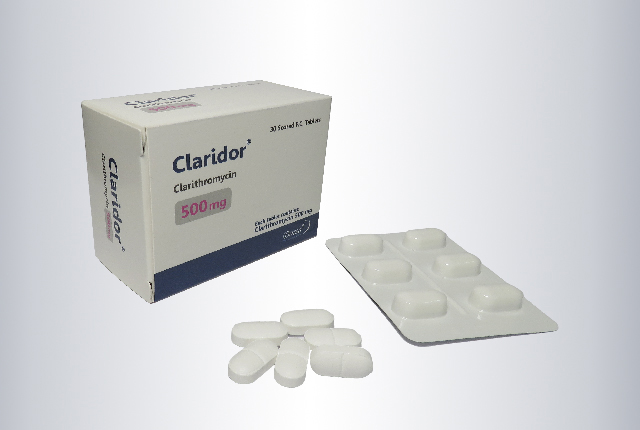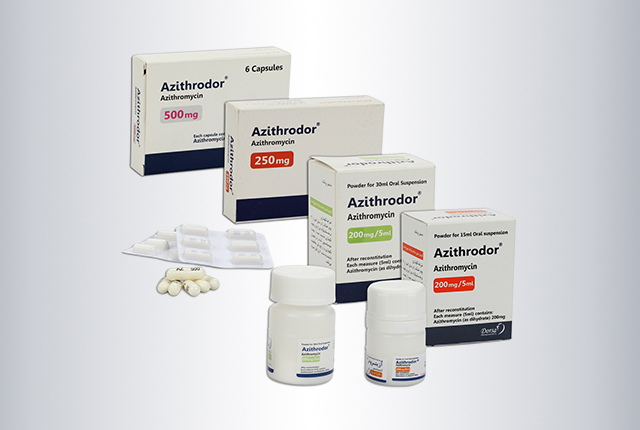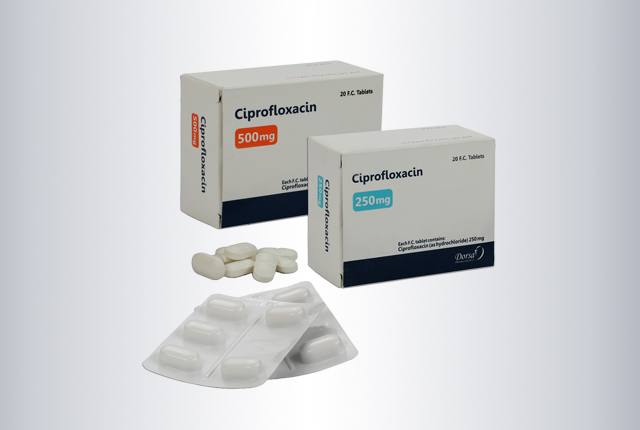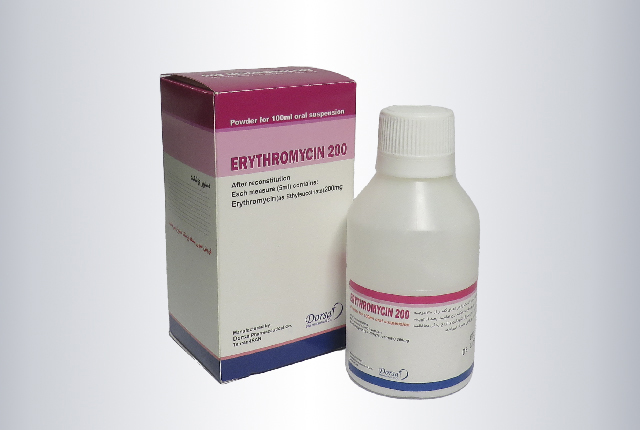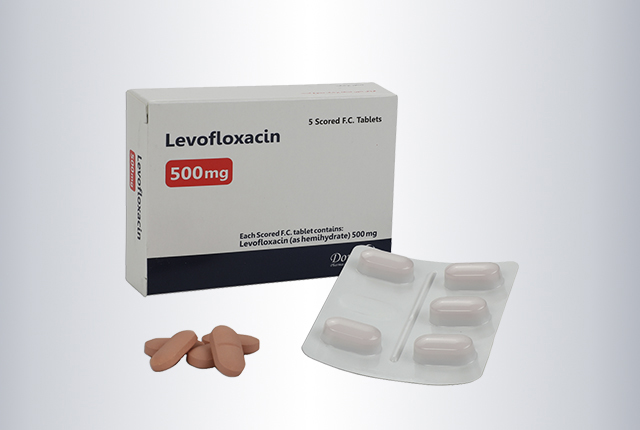Claridor®
Here is a summary of the information about Claridor®. If there is anything you do not understand, please ask your doctor or pharmacist to explain it to you.
- Keep out of the reach of children.
- Do not use after the expiry date printed on the label.
- FDA pregnancy category: C
- Rx only.
- Do not throw away any medicines via wastewater or household waste. Ask your pharmacist how to throw away medicines you no longer use.
Gerenal information
Patient Information
Claridor® is an antibiotic that belongs to the group of medicines called macrolides. These medicines work by killing or stopping the growth of bacteria which cause infections. It contains
the active ingredient clarithromycin. Your doctor, however, may have prescribed Claridor®for another purpose. Ask your doctor if you have any questions about why Claridor®has been prescribed for you.
What Claridor® is used for:
Claridor® is used to treat following infections:
- Chest infections such as bronchitis and pneumonia,
- Throat and sinus infections,
- Skin and soft tissue infections,
- Helicobacter pylori infections associated with duodenal ulcers.
This medicine is indicated in adults and
children 12 years and older.
Tell your doctor or pharmacist before using Claridor® if:
- You have heart problems (e.g. heart disease, heart failure, an unusually slow heart rate)
- You have any liver or kidney problems
- You have, or are prone to, fungal infections (e.g. thrush)
- You are pregnant or breast feeding
- You are taking oral contraceptive pills and diarrhoea or vomiting occurs, as you may need to take extra contraceptive precautions such as using a condom.
Know all the medicines you take. Keep a list of them with you to show your doctor and pharmacist.
Who should not take Claridor®:
- If you have an allergy to medicines containing clarithromycin, the active ingredient or to any of the other ingredients in Claridor®, other antibiotics from the macrolide family, such as,
- erythromycin, roxithromycin or azithromycin.
- If you have severe liver problems.
- If you have poor kidney function.
- If you have cardiac arrhythmia (irregular heartbeat).
- If you have heart condition called long QT syndrome (or QT prolongation).
- If you have hypokalaemia (low potassium levels in blood).
How to take your Claridor®:
Follow all directions given to you by your doctor or pharmacist carefully. If you do not understand the instructions, ask your doctor or pharmacist for help.
Claridor®tablets should be swallowed whole with a glass of water. If you need to break Claridor®, hold tablet with both hands and snap along break line.
What to do if you forget to take a dose:
Take your dose as soon as you remember, and continue to take it as you would normally. If it is almost time for your next dose, skip the dose you missed and take your next dose when you are meant to. Do not take a double dose to make up for the dose you missed. This may increase the chance of you getting an unwanted side effect. If you are not sure what to do, ask your doctor or pharmacist. If you have trouble remembering when to take your medicine, ask your pharmacist for some hints.
While taking your medicine:
- If you are about to start taking a new medicine, tell your doctor and pharmacist that you are taking Claridor®.
- If you become pregnant while taking this medicine, tell your doctor immediately.
- If you are taking Claridor®for an infection and your symptoms do not improve within a few days, or if they become worse, tell your doctor.
- If you get severe diarrhoea, tell your doctor or pharmacist Do this even if it occurs several weeks after stopping Claridor®.
- Diarrhoeamay mean that you have a serious condition affecting your bowel. You may need urgent medical care. Do not take any medicine to stop your diarrhoea without first checking with your doctor.
- Tell your doctor immediately if you experience any heart palpitations, changes in heartbeat, dizziness or fainting while taking Claridor®.
- If you have to take any urine tests, tell your doctor you are taking Claridor® as it may affect the results of some laboratory
- Claridor® may make you feel dizzy or drowsy. If they affect you in this way do not drive, operate machinery or do anything that requires you to be alert.
- If you are taking oral contraceptive pills and diarrhoea or vomiting occurs, as you may need to take extra contraceptive precautions such as using a condom.
Call your doctor right away if you have:
- severe or prolonged diarrhoea, which may have blood or mucus in it. Diarrhoea may occur over two months after treatment with Claridor®, in which case you should still contact your doctor.
- a rash, difficulty breathing, fainting or swelling of the face, tongue, lips, eyes and throat. This is a sign that you may have developed an allergic reaction.
- yellowing of the skin (jaundice), skin irritation, pale stools, dark urine, tender abdomen or loss of appetite. These are signs that your liver may have inflammation and not be working properly.
- severe skin reactions such as painful blistering of the skin, mouth, lips, eyes and genitals (symptoms of a rare allergic reaction called Stevens-Johnson syndrome/toxic epidermal necrolysis).
- a red, scaly rash with bumps under the skin and blisters. The frequency of this side effect is not known.
- rare allergic skin reactions which cause severe illness with ulceration of the mouth, lips and skin which causes severe illness with rash, fever and inflammation of internal organs (DRESS).
- muscle pain or weakness known as rhabdomyolysis.
What to do if you take too many Claridor®:
Immediately telephone your doctor, or the Poisons Information Centre for advice or go to
Accident and Emergency at the nearest hospital, if you think you or anyone else may have taken too much Claridor®. Do this even if there are no signs of discomfort or poisoning. You may need urgent medical attention. Symptoms of an overdose may include severe gastrointestinal symptoms, liver problems, or allergic reactions.
Side effects:
All medicines can have side effects. Sometimes they are serious, most of the time they are not.
The more common side effects by Claridor® are stomach cramps and painsو nausea, vomiting and severe diarrhea, oral thrush (sore white mouth or tongue) or vaginal thrush (vaginal itching or discharge), change in taste sensation, headache, asthma, shortness of breath, muscle weakness, pain or spasms, conjunctivitis, chills, fatigue, eructation, stomach distension, flatulence.
Reporting of side effects:
If you get any side effects, talk to your doctor, pharmacist or nurse. This includes any possible side effects not listed here.
You can also report side effects directly via the Yellow Card Scheme at: www.dorsapharma.com/ (ADR form)
By reporting side effects, you can help provide more information on the safety of this medicine.
Product specification
| Generic name | Clarithromycin |
| Trade name | Claridor® |
| Dosage form | 500 mg white oval concave scored F.c.tablet |
| Category | Anti infective, Macrolids |
| ATC code | J01FA09 |
| Package | Box of 5 Alu-PVDC blisters of 6 tablets |
| Active ingredient | Clarithromycin |
| Storage | Below 30°C. Protect from light & moisture. |
| Shelf life | 2 years |
